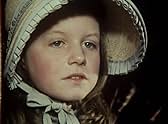Nach einer harten Kindheit wird das Waisenkind Jane Eyre von Edward Rochester, dem grüblerischen Herrscher eines geheimnisvollen Herrenhauses, eingestellt, um sich um seine kleine Tochter zu... Alles lesenNach einer harten Kindheit wird das Waisenkind Jane Eyre von Edward Rochester, dem grüblerischen Herrscher eines geheimnisvollen Herrenhauses, eingestellt, um sich um seine kleine Tochter zu kümmern.Nach einer harten Kindheit wird das Waisenkind Jane Eyre von Edward Rochester, dem grüblerischen Herrscher eines geheimnisvollen Herrenhauses, eingestellt, um sich um seine kleine Tochter zu kümmern.
Fotos
Handlung
WUSSTEST DU SCHON:
- WissenswertesEdward de Souza, who played Mason in this adaptation would go on to play the same part in the 1996 Franco Zeffirelli movie that also featured William Hurt, Charlotte Gainsburg and Anna Pacquin.
- Zitate
Jane Eyre: I was myself still, without obvious change. Yet where was the Jane Eyre of yesterday? Where were her hopes? Where were her prospects? My hopes were all dead: struck with a subtle doom as in one night fell on all the first-born of Egypt. I looked on my cherished wishes: they lay still, stark corpses that could never revive. I looked at my love: it shivered in my heart like a suffering child in a cold cradle.
- VerbindungenFeatured in The Brontes at the BBC (2016)
Before you invest money, I urge you to view some of the 1973 scenes, currently on you-tube. Everyone has a different idea of what good is and -- poor production values aside -- I fear some will find these performances either off point with the story, or too intellectualized by today's standards.
I'm not opposed to narration; Jane has few enough lines and Brontë's words are visceral, stunning and instructive about her heroine. But the voice overs *here,* take place during scenes with a lot of dialog. Since the actors can as easily fill in subtext, the running commentary is pointless. The only place I've seen the device used effectively is in comedies, like SCRUBS, where the split-hair-timing of the juxtaposed VO and dialog actually helps *create* the humor. However *here,* it is not used to *any* dramatic effect whatsoever.
Jayston is probably the stronger of the two and he IS endearing (especially when singing at the piano), but lacks the edge and imposing presence of the Rochester in the novel. Cusack also has her moments, but she plays nearly every scene with arched eyebrows (for reasons I cannot begin to fathom) which gives her the appearance of wearing a mask. And barely seems able to conceal a condescending smirk, which alternates with a gape-eyed stare. Neither of which pass for Jane's keen intelligence and curiosity, nor her lack of world experience. She HAS since acknowledged she didn't really have a handle on the role, though I know ardent fans will disagree. Although the 1973 and 2006 BBC adaptations are very different -- the former tried to remain faithful to the novel, while the latter couldn't get far enough away from it -- I found both suffered from a lack of character contrast and dynamic.
I would like to tip my cap to Geoffrey Whitehead, who for me turned in an extremely gratifying performance as St. John Rivers. He was understated and energetic -- as connected to the material as his character was distant from the lives he missioned to save. Rigid, frigid and shocking in his presumption of what was best for others. Ambitious and frighteningly blinded by the authority afforded him by his collar. I felt it all from Whitehead. It was without a doubt the performance that engaged me most consistently. Despite the intrusive narration.
This adaptation does include the problematic gypsy segment. However, Jayston who has some wonderful subtle moments in other scenes, rides the surface of what little of Brontë's words are used here, instead of delivering them with full intention. In any case it wouldn't have landed since in this version, Jane guesses immediately. Cusack signifies this with a jig-is-up grin, almost straight out of the gate, instead of becoming vulnerable to and absorbed by the words, (if for no other reason, than the sharp insight they carry.) And absorbing us along with her. For me the meaning of the segment was lost. This exemplifies a problem I had throughout this adaptation; the scene is there, but not the intention.
Understandably this scene has only been attempted once as written. Probably because it's tough to pull off, since the audience invariably "knows." The key is both actors have to play it straight from their respective point of views. When done with full commitment, no feigned (and invariably funny) gypsy voice will prevent the words from being heard. And if Jane becomes fully involved, after her initial resistance (which helps put us in her corner and provides a dramatic pass, into *her* shifting reality) we'll follow her. Done right the scene allows for a bizarre but fascinating mix humor and intended poignancy.
Otherwise the writers failed to cut passages in ways that make Brontë's dialog playable (and the '83 adaptation demonstrates that *much* of it is *very* playable). So part of the problem may lie there. *I do think the more dynamic '83, which presumably had the lowest budget per hour, is richer and more realized. It's equally faithful and a lot less self conscious, at least to this viewer. True they took some risks, but with few exceptions, most of them paid off.
*If you need great production values, neither version will work for you.
Top-Auswahl
Details
- Erscheinungsdatum
- Herkunftsland
- Offizieller Standort
- Sprache
- Auch bekannt als
- Τζέιν Έιρ
- Drehorte
- Produktionsfirma
- Weitere beteiligte Unternehmen bei IMDbPro anzeigen
Zu dieser Seite beitragen




























